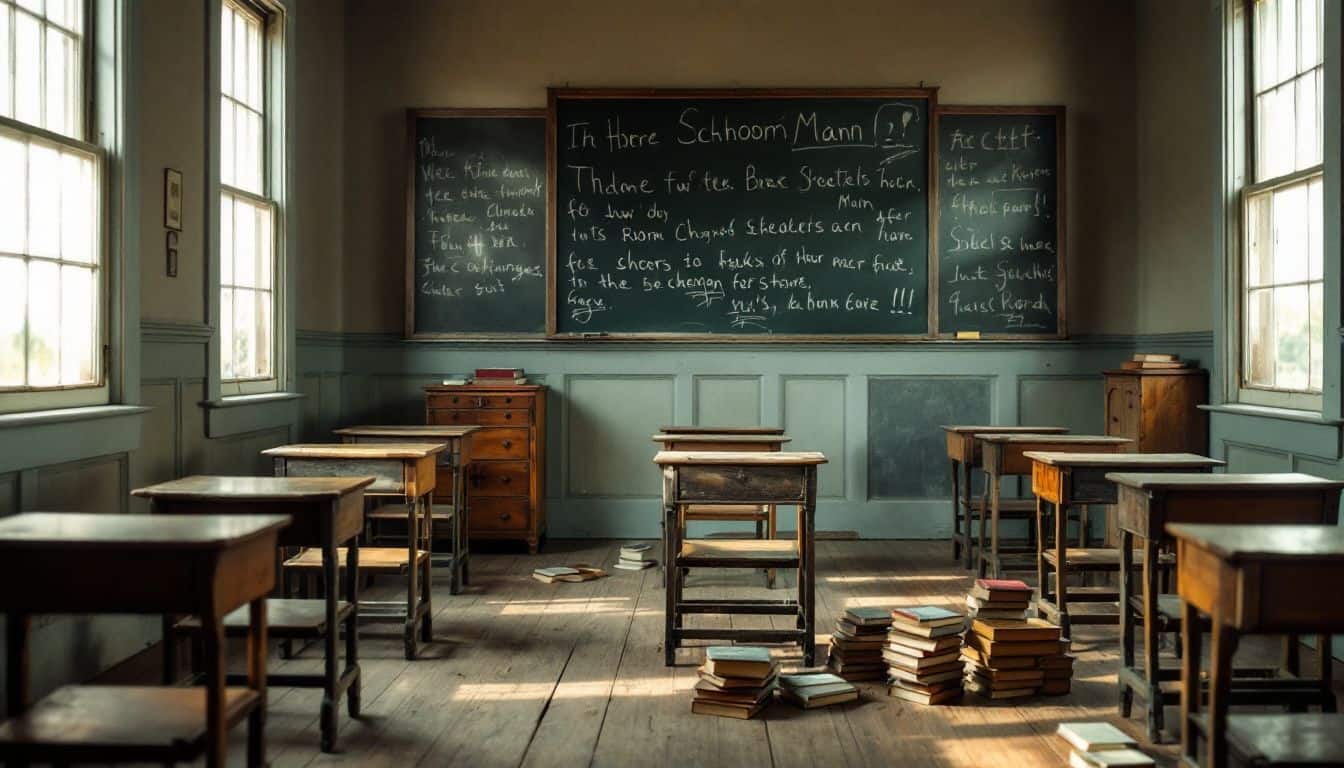Ever wondered who came up with homework? I know I have! As a mom who’s spent many late nights helping with assignments (and complaining about them), I’ve pondered this question countless times.
After digging deep and falling down some interesting research rabbit holes, I’ve uncovered some surprising facts about homework’s history. In this post, I’ll share the real scoop on who invented homework and how it’s changed over time.
So grab a snack, get comfy, and let’s take a little trip down memory lane together! I promise it’ll be more fun than actually doing homework.
Key Takeaways
Homework has ancient roots, with Roman teacher Pliny the Younger assigning at-home public speaking practice around AD 61-113.
Horace Mann popularized homework in the U.S. in the 1840s after observing Prussia’s education system.
Roberto Nevilis did not invent homework in 1095 or 1905 as some claim – this is a myth.
Homework policies have changed over time, from California banning it in 1901 to increased emphasis during the Cold War space race.
Modern debates about homework focus on its effectiveness, equity issues, and alternative approaches like project-based learning.
Table of Contents
Tracing the Origins of Homework

Ever wonder who came up with homework? I did too! Let’s dig into the past and uncover some surprises about where those after-school assignments came from.
Pliny the Younger and the Early Assignments

I’ve always been fascinated by the origins of homework. Let’s talk about Pliny the Younger, a Roman teacher from way back in AD 61-113. This guy was ahead of his time! He had his students practice public speaking at home.
Can you imagine? It wasn’t exactly the math problems or book reports we think of today, but it was a start.
Pliny’s idea was simple – keep learning outside the classroom. He wanted his students to get better at talking in front of others. It’s kinda like when I tell my kids to do my homework for me to practice their skills.
Pliny’s method caught on, and soon other teachers in ancient Rome were giving out-of-class work too. It’s cool to think that homework has such deep roots!
Practice makes perfect, even in ancient Rome! – Pliny the Younger (probably)
Horace Mann and the Standardization of Schooling in the U.S.

From ancient assignments to modern schooling, the path of education has been long and winding. Now, let’s talk about a guy who really shook things up in American schools – Horace Mann.
This dude was like the rockstar of education back in the 1800s. He took a trip to Prussia in the 1840s and saw how they did things there. It blew his mind! He thought, “Hey, we could use some of this stuff back home.”.
So, Mann came back to the U.S. and started pushing for big changes. He wanted all kids to have a shot at learning, not just the rich ones. He brought in the idea of homework as we know it today.
Can you believe it? By 1900, kids all over America were doing homework. But not everyone was thrilled. Some parents and students weren’t fans of this new system. Still, Mann’s ideas stuck.
He believed homework could help kids learn better and be more responsible. It’s crazy to think how one man’s trip changed the way we do school in America. Thanks to him, I spent many nights wrestling with math problems!
Influential Figures in the Evolution of Homework

I’ve dug deep into the history books, and boy, did I find some surprises! Let’s talk about the big names who shaped homework as we know it. These folks weren’t just teachers – they were real game-changers in education.
Roberto Nevilis: Debunking the Myths

Let’s talk about Roberto Nevilis, the guy some folks say invented homework. Spoiler alert: he didn’t. I’ve dug into this, and it’s a myth that’s spread like wildfire online. People claim Nevilis came up with homework in 1095 or 1905 – both dates are wrong.
It’s just clickbait, plain and simple.
Here’s the real scoop: homework was around way before Nevilis. In 1901, California even banned it for kids under 15. That tells us homework was already a thing back then. So, next time someone tries to pin homework on poor Roberto, you can set ’em straight.
It’s like my old teacher used to say:.
Don’t believe everything you read on the internet, especially about homework’s history!
Horace Mann: The Advocate of Systematic Education

I’ve always been fascinated by Horace Mann’s impact on education. This 19th-century politician and reformer shook things up in American schools. In 1843, he brought homework to the U.S. – can you believe it? Mann got his ideas from Germany’s Volkschule system.
He saw how they used homework and thought, “Hey, we should do that too!”.
Mann wasn’t just about giving kids more work, though. He wanted to make school better for everyone. He pushed for the state to have more say in education. It was a big deal back then.
Mann believed homework could help kids learn more and be ready for life. His ideas changed how we think about school even today. Pretty cool for a guy from almost 200 years ago, right?
The Development of Homework Through the Ages

I’ve seen homework change a lot over time. It’s like a rollercoaster ride through history – ups, downs, and unexpected turns!
Educational Practices from Past to Present

I’ve seen education change a lot over time. Back in ancient Greece, teachers like Plato taught students through talks and debates. They didn’t have homework as we know it today. Fast forward to the 19th century, and Horace Mann shook things up in American schools.
He brought in the idea of regular homework to help kids learn better. It’s wild to think how much has changed since then!
Now, we’re seeing new ways of learning pop up all over. Project-based learning is getting big – it’s where kids work on real-world problems instead of just reading textbooks. And some schools are trying out “flipped classrooms.” That’s where students watch lessons at home and do practice work in class.
It’s like turning the old way of doing things upside down! These new methods aim to make learning more fun and useful for today’s kids.
Significant Educational Reforms in the 20th Century

The 20th century saw big changes in how we teach kids. I’ve seen some wild swings in homework policies! In 1901, California said “no homework” for kids under 15. Can you believe it? Then in the 1930s, some folks even called homework “child labor.” Yikes! But things flipped again when Russia launched Sputnik in 1957.
Suddenly, everyone wanted tougher homework to keep up in the space race.
Education is the most powerful weapon which you can use to change the world. – Nelson Mandela
These shifts show how much our views on learning can change. By 1986, the U.S. government was all for homework again. They said it helped kids learn better. It’s crazy how ideas about school can flip so fast! Next, let’s look at how the Cold War affected homework….
The Role of Homework during the Cold War

I recall the Cold War vividly. It was a tense time, and homework became crucial. After the Soviets launched Sputnik in 1957, we got worried. We thought we were lagging in science and math.
So, schools assigned more homework. They wanted us to catch up and outdo the Russians.
I had to solve loads of math problems every night. My friends and I spent hours working on equations and learning formulas. It wasn’t enjoyable, but we felt like we were doing our bit for America.
The government pushed for harder classes and extra homework. They hoped it would make us smarter and keep us ahead in the space race. Looking back, it was a wild time. All that homework pressure just because of a satellite! Next, let’s discuss how homework fits into today’s schools….
Contemporary Debates Surrounding Homework

Homework’s got everyone talking these days. It’s a hot topic that’s stirring up debates in schools, homes, and even online… and boy, do people have opinions!
Analyzing Homework’s Effectiveness and Challenges
I’ve been looking into homework’s effectiveness, and wow, it’s a mixed bag. On one hand, moderate homework can boost learning and help kids grasp concepts better. It’s like a mental workout after school.
But here’s the thing – too much homework is causing some serious stress. I was surprised to learn that over 60% of college and high school students report mental health issues due to homework.
That’s a warning sign we can’t ignore.
As a mom, I worry about finding the right balance. We want our kids to learn, but not at the cost of their well-being. I’ve seen firsthand how too much homework can cut into family time and cause anxiety.
It’s hard when your child is up late, struggling with assignments. Sometimes, I think there might be a better way. Maybe we need to reconsider how we use homework, making it more focused and less time-consuming.
After all, learning shouldn’t come at the expense of a child’s happiness or family life. If you’re feeling overwhelmed by your child’s homework load, keep in mind that essay writing services can offer help and guidance.
Discuss Equity and Access in Homework Assignments
Let’s talk about fairness in homework. It’s a big deal. Some kids have better opportunities for doing schoolwork at home than others. Some have quiet spaces and fast internet. Others don’t.
It’s about more than just having stuff, though. Some families can help with difficult math problems. Others might not speak English well. These differences can make homework more challenging for some students.
We need to consider how to make homework fair for everyone. Maybe we could give kids more time at school to finish work. Or we could make sure everyone has the tools they need at home.
Homework should help all students learn, not just the fortunate ones. Next, let’s look at how homework fits into today’s schools.
Exploring Alternative Approaches in Education
Moving from equity issues in homework, I’ve been looking into new ways of teaching. Schools are trying out fresh ideas that don’t rely on old-school homework. I’ve seen some cool stuff happening! For example, some places to study now focus on hands-on projects instead of worksheets.
Kids work together to solve real problems, which is way more fun than boring drills. Another neat trick is personalized learning. It’s like a tailor-made lesson plan for each student.
I love how it lets kids learn at their own speed and dive deep into what interests them most. These new methods aim to make learning more engaging and useful in real life. It’s exciting to see education evolve to fit today’s world better!
Homework’s Role in Modern Education

Homework’s still a big deal in schools today – it helps kids learn better and grow up. Want to know more about how it all started? Keep reading!
How Homework Reinforces Learning
I’ve seen firsthand how homework can be a game-changer for learning. It’s like a mental gym where kids flex their brain muscles after school. When I give out assignments, I’m not just piling on extra work.
I’m helping students cement what they learned in class. It’s amazing to see how tackling problems at home helps kids grasp tricky concepts better.
Homework isn’t just about memorizing facts. It’s a chance for students to put their knowledge to the test in real-world situations. I love watching my students’ eyes light up when they connect classroom lessons to their daily lives.
Plus, homework builds crucial skills like time management and self-discipline. These are the building blocks that’ll serve them well beyond their school years.
Fostering Self-Discipline and Responsibility Through Homework
I’ve seen firsthand how homework builds self-discipline in students. It’s like a daily workout for the mind. Kids learn to manage their time, set priorities, and follow through on tasks.
These are skills they’ll use their whole lives. Homework also teaches responsibility. When a teacher assigns work, it’s up to the student to get it done. No one’s standing over their shoulder.
They have to motivate themselves and be accountable. It’s not always easy, but it’s how kids grow into responsible adults.
Homework isn’t just about memorizing facts. It’s about developing good habits. Students learn to plan ahead, avoid distractions, and stick to deadlines. These are the same skills they’ll need in college and their future jobs.
Plus, homework gives kids a chance to practice what they’ve learned in class. It helps cement the knowledge in their brains. So while it might not always be fun, homework plays a big role in shaping successful, disciplined individuals.
People Also Ask
1. Who’s the brains behind homework?
Surprise! It wasn’t one person. Homework’s roots go way back to ancient times. But Johann Gottlieb Fichte, a German thinker, made it big in the 1800s. He pushed for at-home study to boost German nationalism and unify the country.
2. Did any other big names shape homework?
You bet! John Locke and Jean-Jacques Rousseau, two brainy guys from the Enlightenment era, had their say. They thought kids should learn actively, not just sit and listen. Their ideas changed how teachers taught.
3. How did homework become a thing in America?
The Prussian education system brought homework to the U.S. during the Progressive Era. American educators liked how it helped kids learn better. Soon, it was part of the curriculum everywhere.
4. What’s the point of homework, anyway?
Homework’s not just busy work. It helps build research and time management skills. It also boosts problem-solving abilities and improves academic performance. Plus, it gets parents involved in their kids’ learning.
5. Has homework always been popular?
Not at all! It’s been a rollercoaster ride. Some eras loved it, others hated it. Even today, experts debate its value. Some say it causes stress, while others think it’s key to success. It’s a hot topic in education circles.
6. How has homework changed over time?
Homework’s come a long way, baby! In the past, it was mostly about memorizing stuff. Now, it’s more about critical thinking and creativity. Technology’s changed the game too. Kids can now do homework online and get help from all over the world.
References
- https://findmykids.org/blog/en/who-invented-homework
- https://studyfy.com/blog/who-invented-homework-and-why (2023-11-24)
- https://througheducation.com/debunking-the-myth-of-roberto-nevilis-who-really-invented-homework/ (2019-02-18)
- https://study.com/blog/who-invented-homework-the-history-of-a-school-staple.html
- https://historycooperative.org/who-invented-homework/ (2023-11-22)
- https://www.simonstapleton.com/who-invented-homework/ (2024-09-24)
- https://www.researchgate.net/publication/334945642_IMPACT_OF_HOMEWORK_ASSIGNMENT_ON_STUDENTS%27_LEARNING
- https://assess.ucr.edu/sites/default/files/2019-02/cooperrobinsonpatall_2006.pdf
